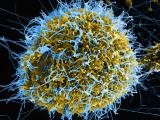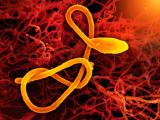In a move that could soothe tensions in West Africa about how the dead bodies of Ebola victims are handled, the World Health Organization (WHO) today released new protocols that weave in religious and family observances while spelling out what burial teams should do to protect themselves and the families of the deceased.
Also today, the WHO's task force on travel and transport released a statement firmly opposing general travel bans and restrictions—including general quarantine—on all travelers coming from Ebola-hit countries, and the US Centers for Disease Control and Prevention (CDC) said it is assembling personal protective equipment (PPE) kits for states that need them.
Burial protocols address sensitivity, safety
Ebola viral levels rise with illness severity, and contact with dead bodies has been one of the main routes of disease transmission in Guinea, Liberia, and Sierra Leone. The WHO estimates that 20% of new Ebola infections occur during burials. Cultural practices at funerals in the region often involve touching and pouring water over the body, practices experts say have fueled transmission chains.
Burial teams using standard protocols have faced pushback and even violence from some communities. Liberia's president in August ordered the cremation of all patients in Monrovia who died from suspected Ebola. However, a drop-off in treatment-bed demand following her announcement led health officials to suspect that some families might be treating patients at home and conducting secret burials—two high-risk activities that spread the virus—to avoid cremation, which goes against some cultural and religious traditions.
In a statement today, the WHO said the new protocols emphasize safe and dignified burials that include family members and encourage religious rites. Pierre Formenty, DVM, MPH, a WHO Ebola expert, said in the statement, "Introducing components such as inviting the family to be involved in digging the grave and offering options for dry ablution and shrouding will make a significant difference in curbing Ebola transmission."
The 19-page illustrated guidance was developed by an interdisciplinary team that included the International Federation of Red Cross and Red Crescent Societies and faith-based groups, both Christian and Muslim. Medical anthropologists also contributed ideas for meaningful, safe ways of touching and bathing dead bodies, based on their study of the region's cultural burial practices.
WHO travel task force raises concerns about travel bans and restrictions
In another development, the WHO's travel and transport task force, which it established in August, called for international governments and transport companies to follow the recommendations of the WHO's Ebola emergency committee, which has urged countries not to impose travel bans or restrictions.
The committee said general bans and quarantines on people arriving from the outbreak countries can create a false impression of control and choke the flow of healthcare workers and responders volunteering to help in West Africa. It also said the steps can hurt trade and slow the flow of food, fuel, and medical equipment to the three affected countries.
The WHO's task force includes leading international organizations from transport, trade, and tourism sectors. Its statement that it stands firmly behind the WHO recommendations against the bans and restrictions comes in the wake of both Canada's recent announcement that it would not issue any new travel or permanent residency visas to residents or citizens of the three outbreak countries and as travel-related quarantine policies announced by many US states exceed CDC Ebola guidance.
The statement also reiterated the emergency committee's recommendation that there shouldn't be a general ban on people from Ebola-hit countries attending international meetings and events. Louisiana health officials recently asked people returning from the region not to attend the American Society of Tropical Medicine and Hygiene (ASTMH) annual meeting, which was held in New Orleans this week.
In its statement today, the WHO included some suggested 21-day precautions for travelers from the three Ebola-stricken countries, which included staying within range of a good healthcare facility, remaining aware of Ebola symptoms, and immediately reporting a fever of 100.4°F (38°C) by phone and mentioning their travel history.
Task force members and the WHO are working on exit-screening guidance for affected countries, steps for countries to keep in mind when considering entry screening, information for airlines and ships on how to safely care for suspected Ebola patients, and protocols for the passenger shipping sector. The group added that it is concerned about reports that some countries denied medical care for sick people who were on ships that had earlier called at ports in the Ebola outbreak region.
CDC bolsters SNS PPE stocks
Meanwhile, the CDC said today that it has ordered $2.7 million in PPE to beef up supplies in the Strategic National Stockpile (SNS) to help US hospitals care for suspected or confirmed Ebola patients. It said in a press release that the supplies are being configured in 50 kits that can be rapidly delivered to hospitals.
PPE purchases are based on new guidance the CDC released on Oct 20. They include impermeable gowns, coveralls, aprons, boot covers, gloves, face shields and hoods, N-95 respirators, powered air-purifying respirator (PAPR) systems, and disinfectant wipes.
CDC said demand for the items has increased since it released the updated recommendations and that product availability varies. The agency emphasized that it is ensuring that its PPE orders aren't disrupting those made by states and hospitals. Manufacturers aren't holding products for the SNS, and SNS orders aren't being placed ahead of ones from hospitals.
Greg Burel, director of the CDC's SNS division, said in the statement, "We are building our stocks so that we can assist when needed. Some of these products are not normally used by hospitals for regular patient care."
The CDC stated that hospitals needing PPE supplies from the SNS should coordinate their requests through their state public health departments.
Other developments
- In its latest outbreak update, the WHO said today that the global Ebola total through Nov 4 is 13,268 infections and 4,960 deaths. In Guinea, Liberia, and Sierra Leone, the reported numbers are thought to greatly underestimate the true burden of the disease. On Nov 5 the WHO aligned its totals with those reported by the country health ministries. Since that update, Sierra Leone has reported 103 infections and 60 deaths, Liberia has reported 94 more illnesses and 69 deaths, and Guinea has reported 29 more cases and 13 deaths.
- The last person being monitored in Texas related to that state's three Ebola cases will be cleared from twice-daily monitoring at the end of today, the Texas Department of State Health Services (TDSHS) said yesterday in a statement. No new cases have been reported aside from the Liberian man who died of Ebola at a Dallas hospital and two nurses who cared for him. Over the past several weeks, the TDSHS has monitored 177 possible contacts. The final person to be monitored is a hospital worker who handled medical waste on Oct 17. As of Nov 5, the Ohio Department of Health cleared 163 people it had been monitoring after one of the sick Dallas nurses traveled to the Akron area shortly before she became ill.
See also:
Nov 7 WHO press release on safe burial protocols
Nov 7 WHO protocols on safe burials
Nov 7 WHO travel and transport task force statement
Nov 7 CDC press release
Nov 7 WHO Ebola situation report
Nov 6 TDSHS statement


















